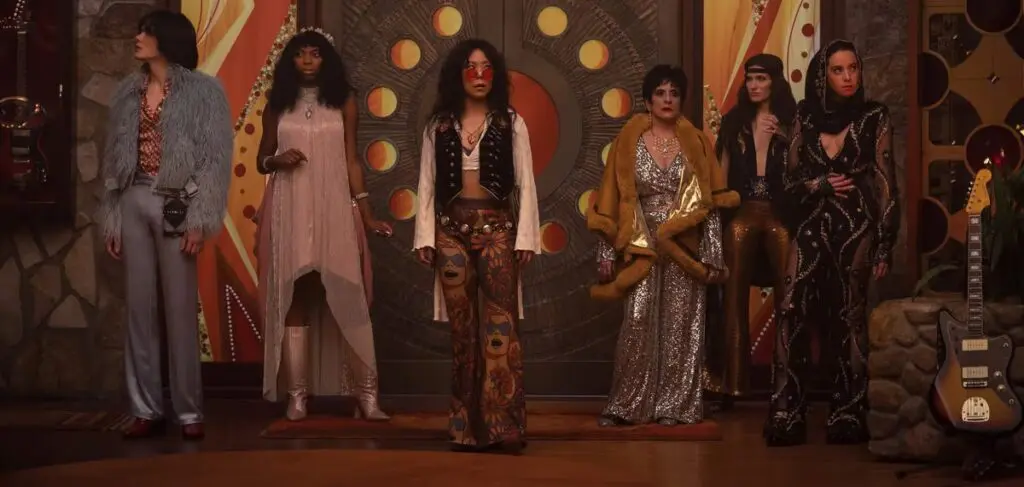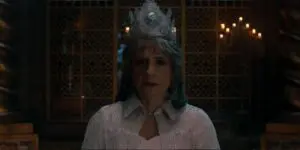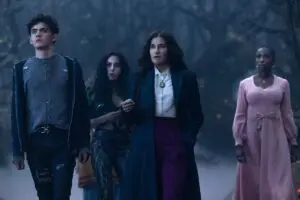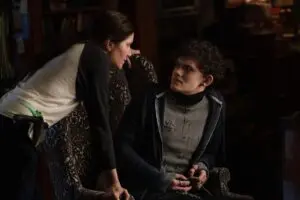Summary
Agatha All Along has really settled into its structure and embraces its homoerotic undertones here. The story might be Agatha’s, but Aubrey Plaza steals the show.
I keep hearing that Agatha All Along is the gayest thing Marvel has done. I’m not sure what this means, or how this can be calculated, or to what extent I, a straight man, could do the sums if it can. But I can feel it, especially in Episode 4, “If I Can’t Reach You / Let My Song Teach You”.
I said that there were pretty clear homoerotic undertones to the fight between Agatha and Rio at the end of the premiere, so a kiss between the two women, whether it’s rejected or not, certainly feels pretty gay. Am I sure of the extent to which this matters? Outside of a representational context, no, I guess not. But at least it gives the show an identity, which in the safest and most increasingly anodyne franchise in entertainment, is certainly something.
Sharon’s Replacement
Since Sharon unfortunately met her end in Episode 3, Agatha’s unconventional coven is down a member. To be fair, Sharon wasn’t a witch in the first place, so she didn’t offer a great deal, but an unfortunate, undeserving casualty is still hard to swallow for everyone except Agatha, who seems used to the idea.
The good news is that Sharon is promptly replaced by Rio, who claws her way out of the ground to introduce some sexual charisma and mystique to proceedings that is very welcome. And it’s fair to say that the show’s baseline energy considerably increases with her presence since the entire vibe of Agatha All Along does seem to be built around Aubrey Plaza’s oddball allure.
Another Trial
The format established in the previous episode is reflected here in “If I Can’t Reach You / Let My Song Teach You”, an aptly-titled episode since it excuses everyone dressing in late ‘60s/early 70s disco attire and a belting rendition of “Lorna’s Ballad”, Alice’s mother’s cover of the song that summons the Road, discussed briefly in Agatha’s recruitment drive in Episode 2.
This reiterates the idea of each trial being intimately tied to one of the coven. It’s Alice in this case; the set is built around her recollections of her late mother’s recording studio, the ticking-clock device is Alice’s curse – symbolized by her birthmarks – spreading to the other witches, and the recital of the song turns out to be a way to keep the curse at bay.
This structure works. Each episode is a good excuse to radically play with the production design and expand the mythology while keeping things fresh and interesting. There are lots of little nods in here – the implication that Rio might be the survivor of Agatha’s previous excursion on the Road, Teen’s parentage (which is apparently nothing to do with Agatha), etc. – that contribute to the wider worldbuilding but the moment-to-moment stuff is very distinct from the previous episode’s trial and aesthetic.
So Close Yet So Far
Agatha All Along Episode 4 ends with Agatha leaning in to kiss Rio and then getting rejected. However, it does seem like this is the direction we’re heading in. Rio mentions something about Teen – “That boy isn’t yours” – to kill the moment, but there are only so many times that’ll suffice as a distraction. Eventually, the moment is coming, you can be pretty sure of that.
Of course, there’s much more to this show than the expectation of a single moment, but since the story is in large part built around that moment, it’s understandable that people would be anticipating it, like Agatha, rather eagerly.
RELATED:




